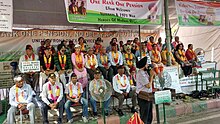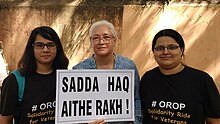One Rank One Pension
| Former Chiefs of Indian Air Force and Navy expressing strong support to OROP. | |
|---|---|

Air Chief Marshal N C Suri, and Admiral L Ramdas, with Maj General Satbir Singh and other veterans.
|
| FAST-UNTO-DEATH | |
|---|---|

Col Pushpender Singh and Hav Major Singh on fast-unto-death at Jantar Mantar OROP protest site.
|
| One Rank One Pension (OROP) | |
|---|---|

Indian ex-servicemen(veterans) on Protest at Jantar Mantar, New Delhi for Equalization of Pension of all veterans retired in same rank with same years of service.
|
| GIVE US RIGHT NOW WHAT IS LAWFULLY OURS | |
|---|---|

Nafisa Ali (actress & veteran's wife) expressing solidarity with OROP protest along with OROP activists Richa and Janhvi.
|
One Rank One Pension (OROP), or "same pension, for same rank, for same length of service, irrespective of the date of retirement", is a longstanding demand of the Indian armed forces and veterans. The demand for pay-pension equity, which underlies the OROP concept, was provoked by the exparte decision by the Indira Gandhi-led Indian National Congress (INC) government, in 1973, two years after the historic victory in the 1971 Bangladesh war, and shortly after Field Marshal SHFJ Manekshaw retired, to decrease armed forces pensions by 20–40 percent, and increase civilian pensions by 20 percent, without consultation with armed forces headquarters.
In 1986, the sense of unease and distrust prompted by the Third Central Pay Commission (CPC) was exacerbated by the Rajiv Gandhi led Indian National Congress (I) Government's decision to implements Rank Pay, which reduced basic pay of captain, majors, lt-colonel, colonels, and brigadiers, and their equivalent in the air-force, and the navy, relative to basic pay scales of civilian and police officers. The decision to reduce the basic pay of these ranks, implemented without consulting the armed forces, created radically asymmetries between police-military ranks, affected the pay, and pension of ten of thousands of officers and veterans, spawned two decades of contentious litigation by veterans. It became a lingering cause of distrust between the armed forces veterans and the MOD, which the government did little to ameliorate. In 2008, the Manmohan Singh led United Progressive Alliance (UPA) Government in the wake of the Sixth Central Pay Commission (6CPC), discarded the concept of rank-pay. Instead it introduced Grade pay, and Pay bands, which instead of addressing the rank, pay, and pension asymmetries caused by 'rank pay' dispensation, reinforced existing asymmetries. The debasing of armed forces ranks was accompanied by decision in 2008 to create hundreds of new posts of secretaries, special Secretaries, director general of police (DGP) at the apex grade pay level to ensure that all civilian and police officers, including defence civilian officers, retire at the highest pay grade with the apex pay grade pensions with One Rank One Pay (OROP).
...
Wikipedia
